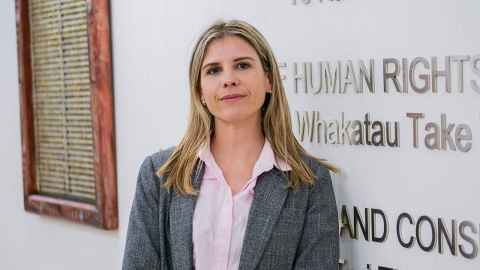Meg de Ronde
Meg de Ronde (Pākehā) is tatau-uruora (chief executive) of Te Kāhui Tika Tangata Human Rights Commission. Previously she was the first woman and the youngest person to lead Amnesty International Aotearoa New Zealand, before serving as Amnesty’s interim regional director for East Asia, Southeast Asia and the Pacific.

At Amnesty, Meg de Ronde and her team successfully campaigned, alongside a broad community coalition, to increase New Zealand’s refugee quota for the first time in 30 years. She led research that revealed deeply concerning violations of asylum seekers’ human rights in New Zealand. She helped secure visas for human rights defenders from Afghanistan, as Kabul fell to the Taliban in 2021.
And she looks on the day Amnesty welcomed Kurdish-Iranian asylum seeker Behrouz Boochani to New Zealand (after his inhumane incarceration by Australia on Manus Island) as “a career defining moment”: “It felt huge and impossible and amazing. Something to tell my grandchildren about as I was so proud of our involvement in this work,” says Meg.
Meg obtained both Bachelor and Master of Arts degrees in Political Studies from the University of Auckland. She remembers: "I’d always felt a bit out of place at school, caring about politics and injustice. So, it was a relief when I found the politics department and other nerdy idealists. We challenged each other and argued – it was great!”
Her head of department, Emeritus Professor Raymond Miller, predicted early on that “natural leader” Meg would “rise to great heights”. She lectured for two years in the department and was head tutor for four. Later on, she found the people she’d hired as tutors ended up “in ministerial offices or NGO leadership or in diplomatic postings around the world.”
At the Human Rights Commission, she’s helping to embed shared Tino Rangatiratanga-Kāwanatanga leadership, as the Commission has established a Tino Rangatiratanga position – tatau-urutahi – to share leadership with Meg’s own position as chief executive. Meg is keen to contribute “to the realisation of Te Tiriti in Aotearoa and constitutional transformation”– a reference to Matike Mai Aotearoa, led by University of Auckland Professor Margaret Mutu and the late Moana Jackson, which envisions true partnership between Māori and Kāwanatanga (the Crown). Meg quotes Witi Ihimaera: “It’s our watch now, the time to make dreams come true.”
Meg calls her 2023 appointment as Commission chief executive “an honour”: “I’m someone who is a little outside the norm, who stands up for what I believe in. That felt like success to me: to be myself and still be recognised as capable and competent for it.”
She’s often been underestimated. “I don’t mind but I do notice it,” she says. She took several years out of the workforce without a plan or parental leave when she had her two children relatively young – a “massive challenge” at the time. “I watched my friends and peers go on to these amazing career successes and I worried I’d messed things up,” she says. “But what I have learnt is you don’t have to achieve everything all at once. There is time to let the universe unfold as it will, and sometimes it’s ok to wait, or go slowly, or say no, or to fail.”
Now her kids are almost teenagers, early parenthood feels like an advantage – Meg’s future career options include working overseas, as well as getting back to fieldwork or, with her private investigator license, investigating miscarriages of justice.
Meanwhile, four years ago when she was 34, she took up surfing and became “obsessed”: “I love it. It’s humbling to be addicted to something you’re never going to be good at. I love the excuse to be carefree and barefoot.” She’s recharging the batteries in order to lead teams “imagining a fair, just world and striving to bring it into existence”.